Key takeaways:
- Effective communication is vital in film production to maintain alignment and build trust among team members.
- Production coordinators play a crucial role in managing logistics, fostering relationships across departments, and adapting to unforeseen challenges.
- Key skills for production coordinators include organizational skills, attention to detail, and adaptability to navigate complexities in the production process.
- Establishing a culture of continuous learning and proactive problem-solving enhances team collaboration and productivity.
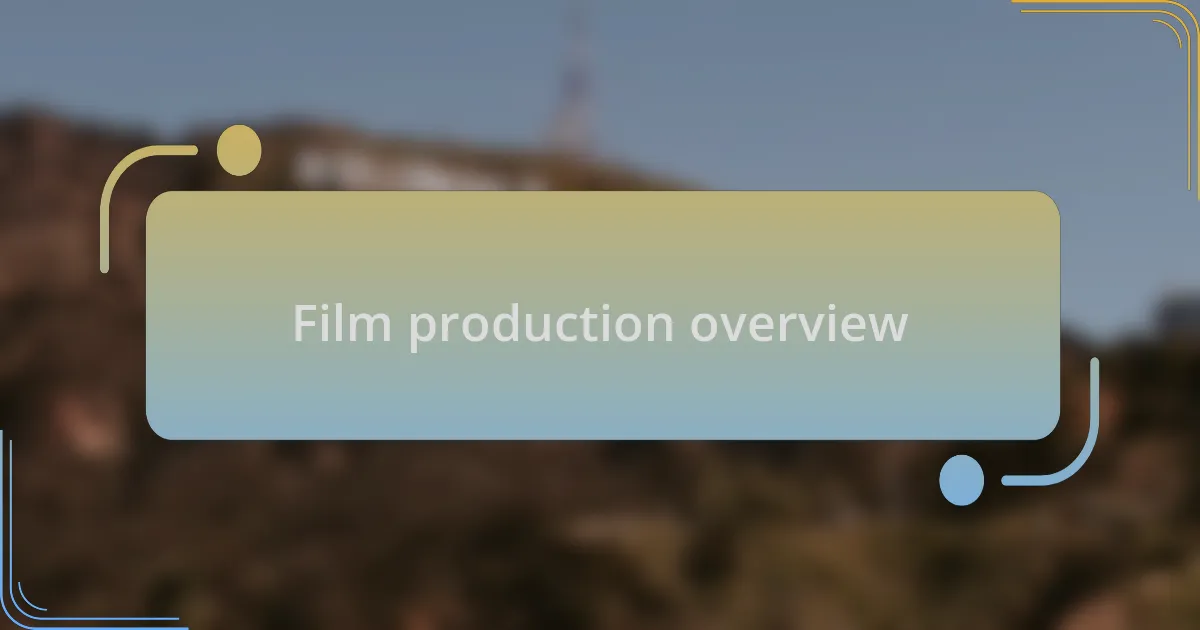
Film production overview
Film production is a complex and dynamic process that brings stories to life on the big screen. From the initial concept to the final cut, each stage requires meticulous planning and coordination. I remember my first encounter with a production team; the energy was palpable, and it struck me how each person played a crucial role in shaping the narrative.
As I delved deeper into the world of film, I started to appreciate the intricacies involved in coordinating a shoot. Consider this: have you ever wondered what it takes to keep a massive crew organized under a tight schedule? Every actor and technician relies on precise communication and timing, something I have experienced firsthand while working on diverse projects where every minute counts.
Moreover, the collaboration between various departments, such as art direction, cinematography, and sound design, is vital. Each element must align to create a cohesive final product. In one project, I saw how the careful coordination of sound and visuals could elevate a scene to evoke genuine emotion. This synergy is what makes film production not just an art but a collective endeavor that requires passion and dedication.
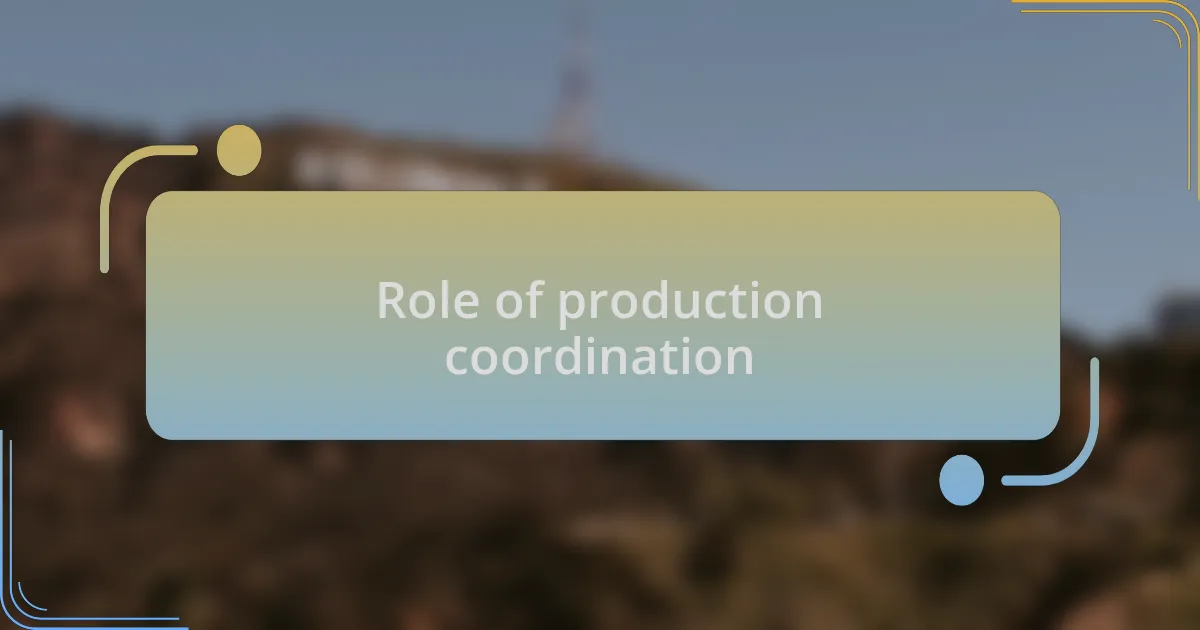
Role of production coordination
The role of production coordination is essentially the backbone of any film project. During one of my projects, I witnessed a producer deftly juggle location permits, actor schedules, and equipment rentals—all critical for keeping the production on track. It really struck me how one small oversight could derail everything, and I learned that attention to detail is paramount.
In my experience, effective coordination is about more than just logistics; it’s about fostering relationships. I remember during a shoot when a last-minute weather change threatened our plans. Thanks to our production coordinator’s quick thinking and excellent communication skills, we managed to rearrange the shooting schedule, ensuring that tensions didn’t rise and collaboration was maintained. It taught me how essential it is to have someone at the helm who can adapt and guide the crew through unforeseen challenges.
Furthermore, a production coordinator acts as a bridge between various departments, like sound and lighting, ensuring everyone is on the same page. I once participated in a project where seamless integration of the visual and audio elements was paramount. The coordinator’s efforts permitted creativity to flourish, ultimately crafting a unified vision. Isn’t it fascinating how a single role can influence the dynamic and outcome of an entire production?
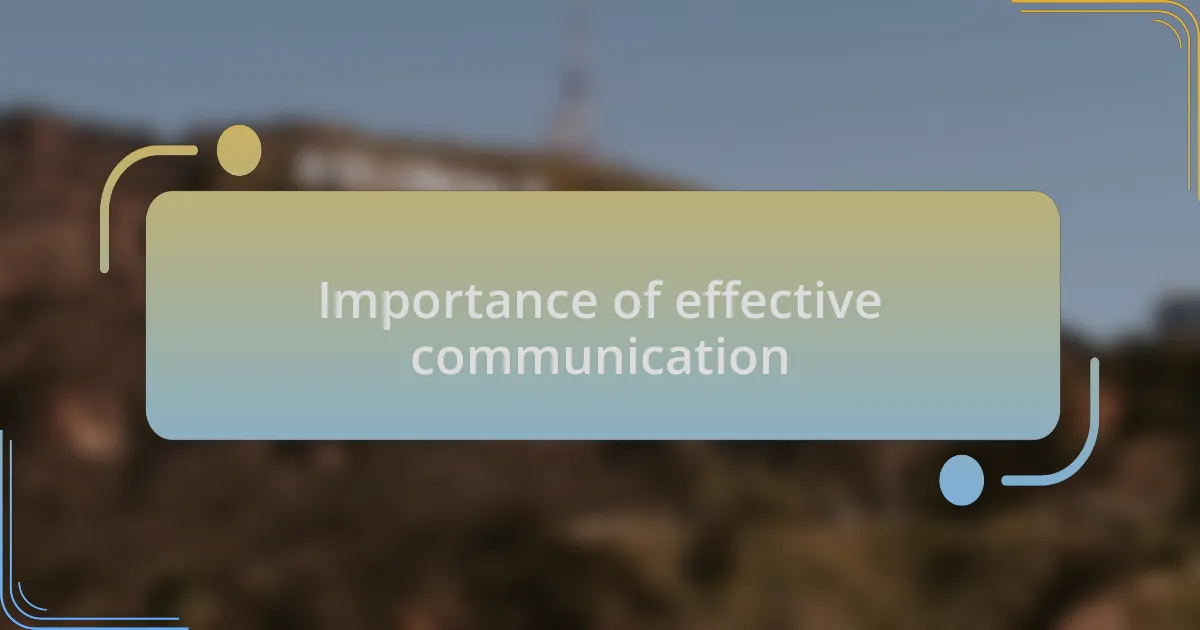
Importance of effective communication
Effective communication is the lifeblood of any film production. I’ve been in situations where the smallest miscommunication turned a calm day into chaos. During one shoot, a last-minute detail about a location change didn’t reach the entire crew until hours before filming. The confusion led to delays and unnecessary stress; it made me realize just how crucial clear, consistent messaging is in keeping everyone aligned.
Moreover, I’ve seen firsthand how great communication can build trust among team members, which is vital for a fruitful collaboration. I fondly recall a time when the director and cinematographer held an open dialogue during pre-production. They iterated on their visions together, which led to a cohesive approach on set. That exchange not only enhanced creativity but also fostered a sense of camaraderie. When all voices are heard, it brings out the best in each person involved.
Finally, effective communication also helps diffuse potential conflicts before they escalate. I remember a particularly tense moment when a disagreement arose over creative direction. The production coordinator stepped in, facilitating a respectful discussion that transformed frustration into compromise. Reflecting on that experience, it’s clear that proactive communication can illuminate pathways to resolution, ensuring the team remains focused on the ultimate goal—a successful production.
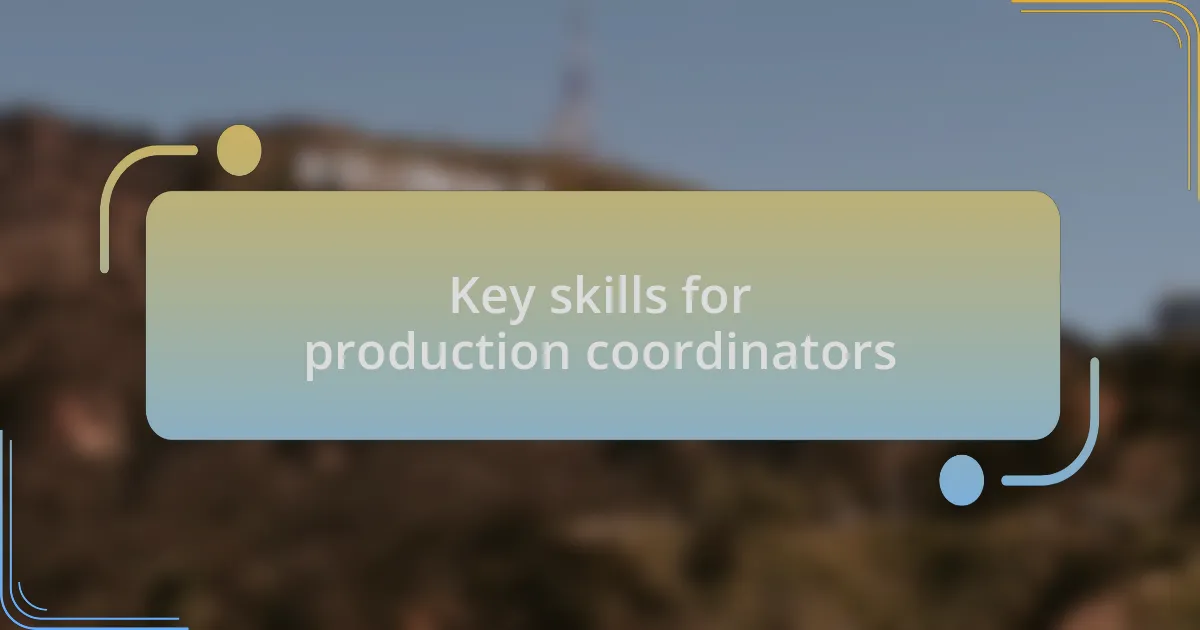
Key skills for production coordinators
In my experience, organizational skills are paramount for a production coordinator. I vividly recall a hectic schedule where each day felt like a race against the clock. Keeping track of multiple locations, cast members, and equipment required not just a bullet-pointed list but a dynamic system that adapted to constant changes. How do you juggle so many moving parts without losing your mind? I found that creating a detailed timeline not only clarified responsibilities but also served as a reassuring visual cue for the entire team.
Attention to detail is another skill that can make or break a production. I once missed a crucial aspect—a cast member’s dietary restriction—during pre-production. It wasn’t until we were setting up for lunch that I realized my oversight. The look on their face made me understand the importance of being thorough, as small details really can have a big impact on morale and the overall production experience. It’s these moments that drive home why maintaining a meticulous checklist for every shoot is vital.
Lastly, adaptability is key; I learned this the hard way when the weather turned unpredictable on a shoot day. We had to switch plans at the last minute, moving everything indoors while keeping the energy high. The ability to pivot in challenging situations not only showcases resourcefulness but also inspires the team to remain flexible. I often ask myself, how prepared am I to face the unexpected, and the answer always comes back to honing my adaptability skills daily.
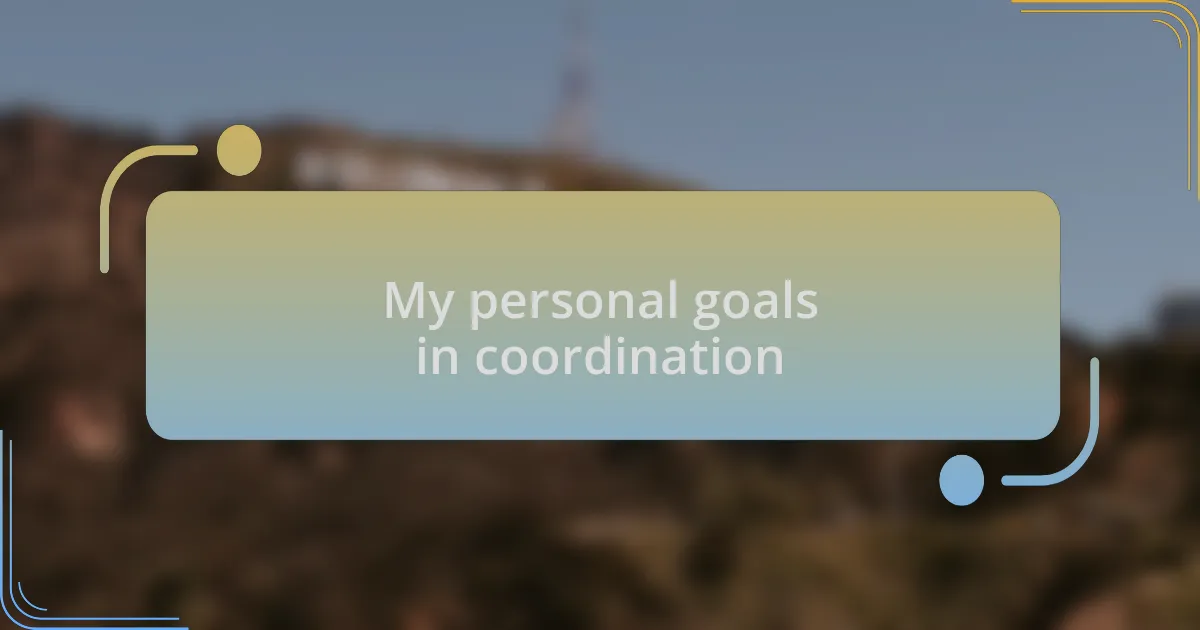
My personal goals in coordination
In my journey as a production coordinator, one of my primary goals is to cultivate a transparent and communicative environment among the team. I remember a project where miscommunication nearly derailed our timeline. After that experience, I made it a point to hold regular check-ins, ensuring that every team member felt heard and informed. How can we expect to collaborate effectively if everyone is on a different page? By nurturing open dialogue, I’ve seen both productivity and morale soar.
Another key goal I have is to foster a culture of continuous learning. Early in my career, I realized the importance of learning not just from my successes, but also from my mistakes. For instance, during a shoot, I overlooked securing a crucial venue, which taught me the value of contingency planning. Now, I encourage my team to share their experiences and insights openly, knowing that each mistake can be a stepping stone to improvement. Isn’t it empowering to turn setbacks into opportunities for growth?
Lastly, I aim to enhance my event management skills, as they’re fundamental to smooth production workflows. I vividly recall orchestrating a large cast-and-crew gathering during a film festival—it was an exciting challenge! I meticulously coordinated every detail, from catering to accommodations, and felt immense satisfaction watching everyone come together. The energy was palpable, and it underscored for me how crucial well-executed logistics are to creating a positive and memorable experience. Isn’t it fulfilling when every piece of the puzzle fits perfectly?
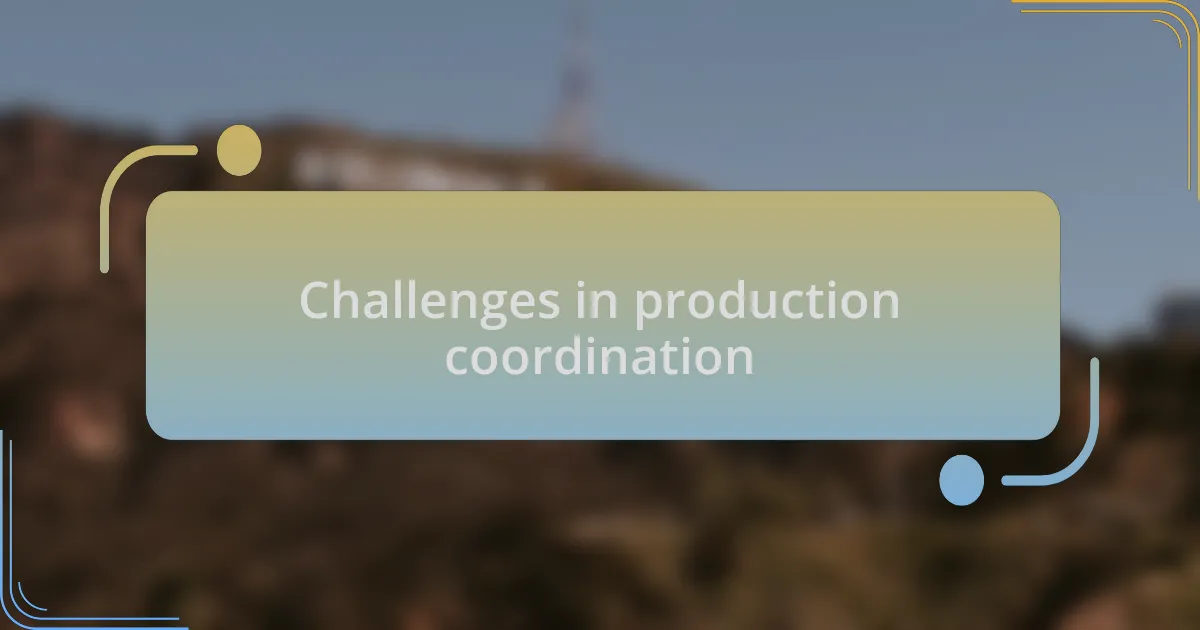
Challenges in production coordination
Production coordination is fraught with unpredictable challenges that can disrupt even the best-laid plans. I once faced a situation where a key supplier failed to deliver essential equipment, causing sleepless nights as I scrambled to find a last-minute alternative. The stress was palpable, but it reinforced the importance of having backup options and strong supplier relationships to navigate such crises swiftly.
Another significant hurdle is managing differing personalities and work styles within the team. During one project, I witnessed firsthand how a clash between two strong-willed department heads could halt progress. This experience taught me that fostering a collaborative environment requires not just communication, but also empathy and active listening. How can we bridge the gap between diverse perspectives? By facilitating discussions that encourage understanding, I’ve seen teams flourish.
Lastly, balancing budgets while meeting creative ambitions poses an ongoing challenge. I vividly remember a project where the script’s grand vision immediately collided with our financial constraints. It prompted discussions that ultimately led to inventive solutions, proving that budgetary limitations can spark creativity rather than stifle it. Isn’t it fascinating how restrictions can ignite innovative thinking?
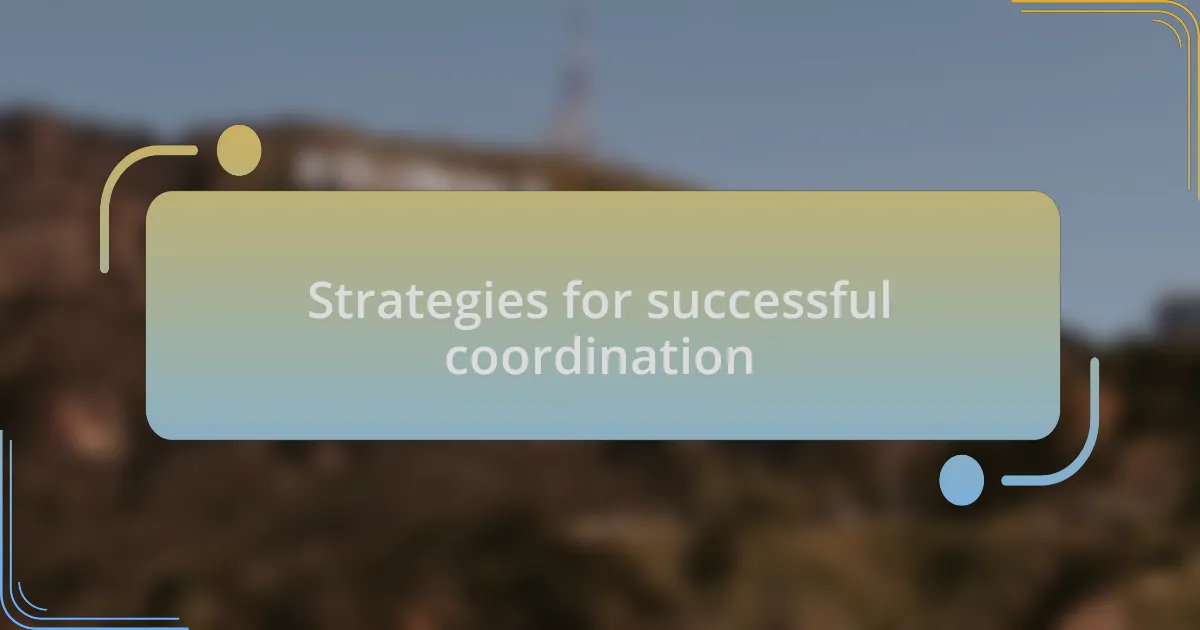
Strategies for successful coordination
Effective production coordination hinges on meticulous planning and clear communication. During one project, I implemented a daily check-in call with key team members, allowing us to address issues promptly. This approach not only kept everyone aligned but also built a sense of camaraderie that motivated the team. How can regular communication positively impact coordination? In my experience, it fosters trust and ensures everyone feels heard.
Utilizing project management tools has been a game changer for me. I recall a time when I integrated a software that allowed us to track progress in real time. Suddenly, everyone was on the same page, and the transparency helped alleviate anxiety about deadlines. Isn’t it amazing how technology can streamline processes? It turns logistical headaches into manageable tasks, enhancing overall productivity.
Lastly, encouraging proactive problem-solving is crucial. I once empowered my assistant to make decisions on smaller issues independently, which freed up my time for larger matters. This not only boosted her confidence but also cultivated a sense of ownership within the team. How can we cultivate an environment where everyone feels empowered? By recognizing and celebrating small victories, I’ve seen teams take initiative in ways that drive successful coordination.